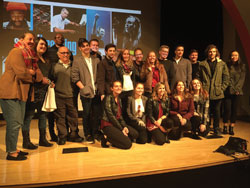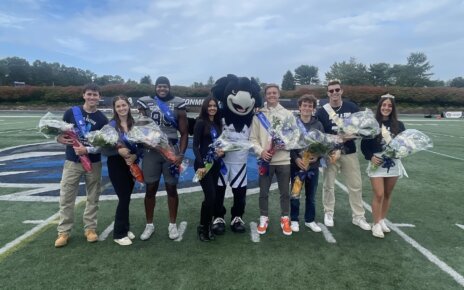On Saturday, Nov. 12, 16 Monmouth students had the unique opportunity to see an advance premiere of a documentary that is described as a “music driven celebration of the art of recording” —Soundbreaking: Stories from the Cutting Edge of Recorded Music. The trip was sponsored by the University’s affiliation with the Grammy Museum, a museum devoted to the history and winners of the Grammy Awards.
Joe Rapolla, Chair of the Music and Theatre Arts Department, said, “Soundbreaking is a great series, and this event is another great way we are leveraging the great resources and connectivity of our Grammy Museum affiliation.”
This eight-episode series, which premiered on PBS Nov. 15, was created as part of a movement to document what happens in American music and the process of creating music. The late Sir George Martin, most famous for producing The Beatles, was a big inspiration in the creation of this film, and he had said antemortem that there had never been a movie made about the importance of technology and recording.
This documentary had been underway for almost 15 years and includes interviews with over 200 artists and producers from various genres and generations of music history. Bob Santelli, Executive Director of the Grammy Museum, explained, “This series takes you behind the scenes into the creative process.” He continued, “It shows you how the role of technology has changed over time and creates a deeper connection to the music.”
Rapolla explained the importance of technology in the Industry, “Technology has always been a key driver of the music business. Using technology to create music, especially popular music, compliments the creative process.”
During the conference, Santelli discussed that although technology definitely helps to make music more accessible for people, it also takes something away from the experience of music. He explained that in the ‘60s and ‘70s, buying and listening to music was a full experience that made people closer to the music—from hearing the single on the radio, to going to buy the record, and then playing that record at home. Music wasn’t easily accessible on our cell phones; therefore, it was more special.
Joey Affatato, a senior music industry student, agreed with Santelli, “As a musician myself, I like having a physical album to be able to really cherish what I have made.” He added, “However, the use of social media and streaming sites helps me to grow my fan base and have my music reach more people.”
Another senior music industry and business management student, Dave DePaola, added, “As a musician and lover of music in general, I prefer analog forms and old fashion styles of music. On the other hand, as an entrepreneur I realize the importance of the new technology in the business and believe it really opens up new opportunities.”
This film series serves as a reminder to all music lovers that the work and effort put into creating music is so worth it, and it is important to bring music to the world. Santelli mused, “Music shapes us and our culture.”
Maro Charymayeff, a director for the series, said, “Performers tend to get the spotlight in most documentaries, but in Soundbreaking we emphasize the fact that producers are also artists in the studio.”
Overall, the conference and private screening was a rewarding experience for all the students in attendance. Kelli Misenheimer, a sophomore music industry student, shared, “I really loved the episodes we watched and I especially loved how they showed the history and development of the music.”
The series definitely allows viewers to gain a greater appreciation for the art of creating music, in many different genres and time periods. Soundbreaking shows us how the soundtrack of American culture was made. Santelli put it best by saying, “The greatest thing about American music is it doesn’t stand still.”
PHOTO COURTESY of Nicole Seitz




